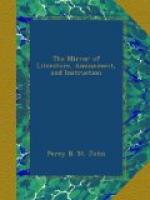P.T.W.
* * * * *
LORD HIGH CHANCELLOR OF ENGLAND.
The second great officer of the crown is the Lord High Chancellor, or Keeper of the Great Seal, which are the same in authority, power, and precedence. They are appointed by the King’s delivery of the Great Seal to them, and by taking the oath of office. They differ only in this point, that the Lord Chancellor hath also letters patent, whereas the Lord Keeper hath none.
He is an officer of very great power; as no patents, writs, or grants, are valid, until he affixes the Great Seal thereto.
Among the many great prerogatives of his office, he has a power to judge, according to equity, conscience, and reason, where he finds the law of the land so defective as that the subject would be injured thereby.
He has power to collate to all ecclesiastical benefices in His Majesty’s gift, rated under 20_l_. a year in the King’s books.
In ancient times, this great office was most usually filled by an ecclesiastic. The first upon record after the Conquest, is Maurice, in 1067, who was afterward Bishop of London.
Nor do we find an elevation of any Chancellor to the Peerage, until the year 1603, when King James I. delivered a new Great Seal to Sir Thomas Egerton, and soon after created him Baron of Ellesmere,[2] and constituted him Lord High Chancellor of England. But until of late years, the custom never prevailed, that the Lord High Chancellor of England should he made an hereditary Peer of the realm. He performs all matters which appertain to the Speaker of the House of Lords, whereby he maybe said to be the eye, ear, and tongue of that great assembly.—Manual of Rank and Nobility.
[2] From him descended the
late Dukes of Bridgewater of that
surname.
* * * * *
NEW BOOKS.
* * * * *
LETTERS ON NATURAL MAGIC.
(This is certainly one of the most ingenious books of the season, and independently of its place as a volume of the Family Library, it has substantive claims which we trust will not he overlooked. It is from the graceful pen of Sir David Brewster, who possesses, in a high degree, the peculiar talent of investing scientific inquiries with the charm of popular delight; in short, of making science easy, and often conveying in a single chapter what others labour to effect in a volume. He, in truth, teaches us the sweet uses of science.
The present work appears to be the suggestion of Sir Walter Scott, to whom it is addressed in letters. We can give but a faint idea of the extent and interest of its subject, which ranges from the magic of the ancients to the intoxicating gas of the moderns; yet the purpose of the work is mainly to trace the connexion of those prodigies of the material world which are termed Natural Magic, with scientific causes. Thus, in the introductory letter, the writer observes on the resources of ancient magic:—)




